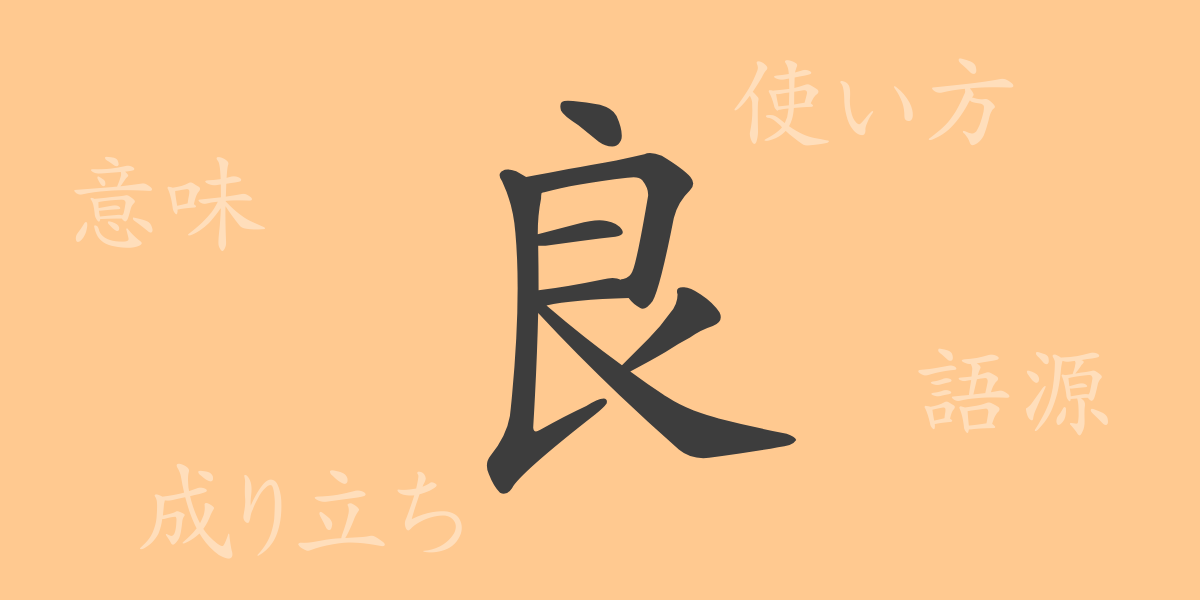In the Japanese language, there are numerous kanji characters, each with its unique history and meaning. In this article, we shine a spotlight on the 常用漢字 (jōyō kanji) “良” (ryō), which is deeply rooted in our daily lives. We will delve into its origins, meanings, usages, and even explore idioms and proverbs that feature this character. Let’s explore the world of “良” (ryō) together, appreciating the rich culture and history behind the words.
The Origin of 良 (ryō)
The kanji “良” (ryō) is derived from ancient Chinese pictographs. Originally, it came from the character “𡗗” (ryō), which means a container for pouring water. Over time, it came to hold positive meanings such as “good” and “excellent.” As the ages passed, its form simplified into the character “良” (ryō) that we know today. This kanji, denoting good or high-quality things, became widely used in Japan and can be seen in various contexts in modern times.
Meaning and Usage of 良 (ryō)
The kanji “良” (ryō) has meanings such as “good,” “excellent,” and “high quality.” It is also used to describe the nature of people and the state of things. For instance, “良心” (ryōshin) means a correct heart (conscience), “良識” (ryōshiki) means correct judgment (common sense), and “良品” (ryōhin) refers to high-quality products. These examples reflect the positive image that “良” (ryō) carries.
Readings, Stroke Count, and Radical of 良 (ryō)
The kanji “良” (ryō) has several variations in its readings in Japanese.
- Readings: In 音読み (on’yomi), it is read as “リョウ” (ryō), and in 訓読み (kun’yomi), it is read as “よい” (yoi) or “いい” (ii).
- Stroke Count: “良” (ryō) is a 12-stroke kanji.
- Radical: The radical is “艮” (gonzui).
Idioms, Proverbs, and Phrases Using 良 (ryō) and Their Meanings
There are numerous idioms, proverbs, and phrases in Japanese that include the kanji “良” (ryō). Here are a few examples:
- 良心的 (ryōshinteki) – Being fair or having reasonable prices.
- 良薬口に苦し (ryōyaku kuchi ni nigashi) – A proverb meaning beneficial things can sometimes be hard to accept.
- 良妻賢母 (ryōsai kenbo) – An exemplary wife and mother who takes care of the household and children.
- 良識ある行動 (ryōshiki aru kōdō) – Actions based on correct judgment.
- 善は急げ (zen wa isoge) – A teaching that one should act quickly when doing good deeds.
Summary of 良 (ryō)
The kanji “良” (ryō), with its simple yet rich meanings, broadens the scope of expression in the Japanese language. Embedded in our daily lives through terms like good quality, conscience, and common sense, this kanji reflects our ethics and values. Idioms, proverbs, and phrases containing “良” (ryō) play a crucial role in conveying Japan’s culture and traditional values. As we continue to encounter the kanji “良” (ryō), let’s remember the profound meanings behind it and cherish the words we use.

























